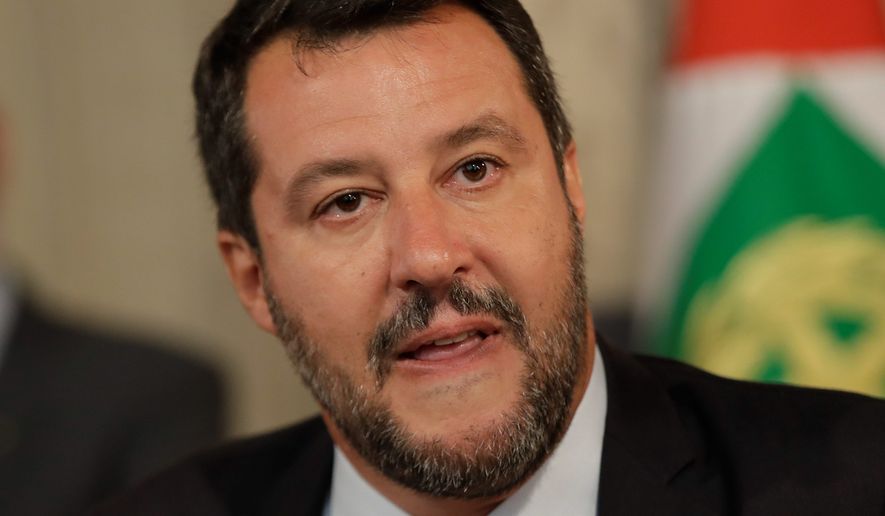ROME | Until a few days ago, it seemed Matteo Salvini could not make a wrong move. Now, after a bold but unsuccessful bid for power, Italy’s hard-charging interior minister and the anti-migrant, nationalist political party he leads could find themselves either destined for a long stay in the political wilderness — or poised for power should their rivals falter.
On Thursday, Italian President Sergio Mattarella gave Prime Minister Giuseppe Conte a mandate to create a new government — this time without the Northern League, the onetime regional party that Mr. Salvini has led to the top of national opinion polls in recent months.
Some say Mr. Salvini badly miscalculated, citing plummeting polls after he torpedoed Italy’s governing coalition. Mr. Salvini, who also lost his post as deputy prime minister, is betting time is on his side.
“So we have to wait six months or a year to win? We’re in no hurry,” he told supporters shortly after the new governing deal.
For most of his time in the public eye, Mr. Salvini had been something of a miracle worker for the League, the party he took over on the brink of irrelevance six years ago.
In the last national vote before Mr. Salvini took over in 2013, the League captured a mere 4% of the vote. But under Mr. Salvini, the League rode a wave of nationalist sentiment to increase its share of the electorate to 6% in 2014, 17% last year, and 34% in voting for European Parliament in June.
The Northern League also won major legislative victories over its now ex-coalition partner, the anti-establishment 5-Star Movement. Mr. Salvini was the public face of Rome’s get-tough attitude on illegal migration from Africa, and he seemed to relish the fights he picked with the European Union over immigration and fiscal policy. He has advocated for a closer alliance of Europe’s nationalist, euroskeptic parties.
Heading into the August break, the party’s approval levels approached the 40% threshold, as a buoyant Mr. Salvini took his politicking to the country’s beaches, where he held rallies and posed for shirtless selfies with supporters.
Soon after, everything starting going wrong.
Looking to rid the Northern League of its uneasy 15-month partnership with the 5-Star Movement, Mr. Salvini tried to force snap elections, bargaining that he could join forces with one or two second-tier parties and lead his own coalition with him after the vote. The plan backfired.
“It must have seemed to Salvini that he had momentum, and that moment was ripe to take power in his hands,” said Franco Pavoncello, a political scientist and president of Rome’s John Cabot University. “So he created a big mess, bringing down the government in August when nobody wants to think about politics and trying to force elections in the fall, something that hasn’t happened in Italy in a hundred years.”
Instead of new elections, the 5-Star Movement cut a deal with the center-left Democrats, allowing Mr. Conte to keep his job and costing Mr. Salvini his. It’s a shaky coalition whose deepest unifying bond may be antipathy for Mr. Salvini.
“Will the Faustian pact work?” asked Lorenzo Codogno, founder and chief economist of LC Macro Investors Ltd. and a visiting professor at the London School of Economics. “The glue for this awkward government will be the desire to prevent Salvini’s League from taking power. Both parties know that if the government fails, that would be a tremendous gift to Salvini, who could sweep back into power.”
The next elections are scheduled for 2023, though they could come sooner if the “Faustian pact” between the 5-Star Movement and the Democratic Party collapses. But as long as those two parties remain in power, it will leave Mr. Salvini on the outside looking in.
“Salvini has been hurt by a self-inflicted wound,” Mr. Pavoncello said. “But he is not dead, he is not out of the game. If he maintains 30% of the electorate, that is a very big number in a fractured political system like Italy’s. It’s enough to let him become a very loud, very consistent, very problematic critic of this new government while hoping it will fall sooner rather than later.”
According to Alessandro Franzi, co-author of “Matteo Salvini: Italy, Europe, and the New Right,” being the head of the largest opposition party could play to Mr. Salvini’s strengths more than being in power.
“His rise was as a critic, not as a policymaker,” Mr. Franzi said. “I think he will fall back into that role with a very specific target: demolishing the alliance between the 5-Star Movement and the Democratic Party and trying to make people forget he was the one who made that alliance necessary.”




Please read our comment policy before commenting.